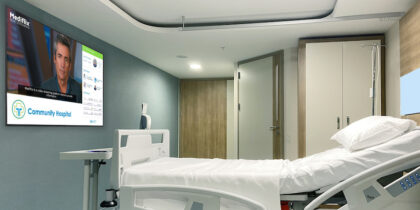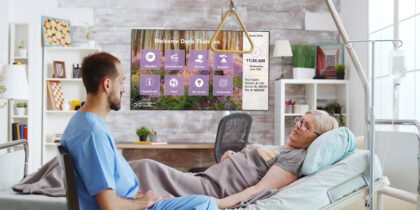Consumerization is the next logical step in patient-centered healthcare. After all, the U.S. is a nation of consumers — turning the focus of healthcare toward the needs, habits and desires of patients means an inevitable shift toward healthcare organizations adopting a perspective that’s already the norm for retailers, banks and most other industries.
As we adjust to the new standards in healthcare, we’re starting to see fresh advancements across the board, not only in the form of new, highly specialized entrants, but also in the evolution of hospitals that are adapting their mobile health strategies to the needs of the new patient consumer.
Feeding the Consumer Need for Insight
Veterans face some of the biggest and most complex consumer challenges in healthcare. Dealing with staff issues, long wait times and red tape led Marine Neil Barrett to build a solution. VAReview.net is a web app that gives veterans access to more transparency around experiences in Veteran’s Affairs care centers. The app allows veterans to find nearby facilities, pull facility information and submit reviews and ratings, sparking a conversation that addresses weaknesses and education within and around the system.
This move toward consumerization is also being felt outside traditional healthcare spaces. Over the last few years, Yelp has expanded its hospital ratings to include all the services its users are already familiar with, plus insight into ER wait times, costs, pain points related to scheduling and compassion of staff, according to the results of a University of Pennsylvania natural language processing analysis of 17,000 Yelp reviews.
While Yelp continues to expand on the consumer side, some healthcare entrants are making their own marks. HealthGrades and WhyNotTheBest.org allow patients to compare hospitals, evaluate different regions, access yearly hospital quality ratings and judge patient safety. Although things aren’t moving quite as quickly on the B2B front, it’s possible to find reviews of EHR platforms on traditional software review sites or get insight into clinical apps in app store reviews.
Ensuring the Security of Healthcare Apps
Download the white paper for a free guide to mobile security in healthcare. Download Now
Hospitals Embrace Mobile
Hospitals are responding to this increased focus on patient needs and desires with wide-spread adoption of mobile health solutions — with 63 percent having a documented mobile strategy in place in 2016 (up from 34 percent just four years ago) according to a survey by Spok, Inc. This increase in mobile health adoption is also a result of initiatives from leading healthcare organizations like Healthcare Information Management Systems Society (HIMSS) that work to encourage productive adoption of mobile strategies. However, according to Health Data Management, security is a factor for those that lag behind. In a survey of 200 healthcare IT decision makers, 92 percent named app security as a top concern, and 29 percent named end-to-end HIPAA compliance as a concern.
When it comes to apps, hospitals are approaching mobile health from both the patient and clinician side with solutions that address a variety of pain points. Solutions range from allowing patients to schedule services through their mobile devices to wayfinding apps that guide their navigation to and throughout a facility. For example, the Lennar Foundation Medical Center at the University of Miami uses the Gozio wayfinding app to guide visitors through its facility, and it will soon feature the cafeteria’s menu. Apps are also emerging to address clinicians’ needs — over 80 percent of these healthcare professionals use smartphones and medical apps. Uses include accessing and altering patient records from any location and staying on top of new industry advancements and healthcare news updates.
As patients become increasingly reliant on digital offerings, hospitals and other healthcare facilities must continue to adopt new mobile strategies that cater to the modern patient consumer.
As the patience experience becomes healthcare workers’ top focus, innovative hospitals are using digital technology to keep patients happy and healthy.









